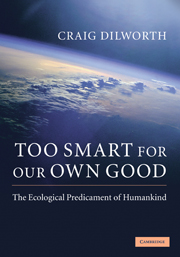Book contents
- Frontmatter
- Contents
- List of figures and tables
- Preface
- Introduction
- 1 Scientific ground rules
- 2 The new views in anthropology, archaeology and economics
- 3 Theoretical background to the vicious circle principle
- 4 The vicious circle principle of the development of humankind
- 5 The development of humankind
- 6 The vicious circle today
- 7 … and too dumb to change
- Conclusion
- Glossary
- Notes
- References
- Index
4 - The vicious circle principle of the development of humankind
Published online by Cambridge University Press: 25 January 2011
- Frontmatter
- Contents
- List of figures and tables
- Preface
- Introduction
- 1 Scientific ground rules
- 2 The new views in anthropology, archaeology and economics
- 3 Theoretical background to the vicious circle principle
- 4 The vicious circle principle of the development of humankind
- 5 The development of humankind
- 6 The vicious circle today
- 7 … and too dumb to change
- Conclusion
- Glossary
- Notes
- References
- Index
Summary
Presentation of the vicious circle principle
As regards the views of Malthus, Boserup and Wilkinson, we should say that each is right in the main. And taken together they can provide a coherent view of certain important aspects of the human condition. But even considering a synthesised version of their views something is missing, and it is the idea that, in the case where population is growing and ecological equilibrium is lacking, the increased exploitation afforded by technology typically provides a surplus, which allows renewed population growth. Once a new line of technological development has been opened it tends to be pursued, and once a resource has been tapped it tends to be exploited. In today's society, the profits made by entrepreneurial capitalists come from this surplus, and are obtained by receiving payment for providing the population with increased material benefits, benefits that may well overshoot the population's vital requirements. In this way technological innovation can have the effect of increasing the potential for a particular area of land to support human habitation beyond the needs of its contemporary population, thereby constituting a major factor in that population's losing its incentive to control its own numbers. This loss of incentive may be manifest e.g. in a cultural shift condoning earlier marriages, or in increasing the convenience of having larger families.
- Type
- Chapter
- Information
- Too Smart for our Own GoodThe Ecological Predicament of Humankind, pp. 109 - 167Publisher: Cambridge University PressPrint publication year: 2009

